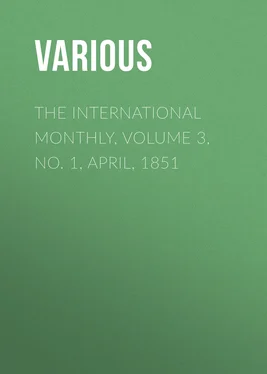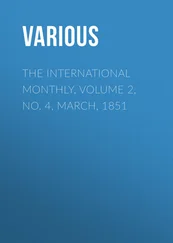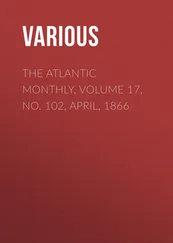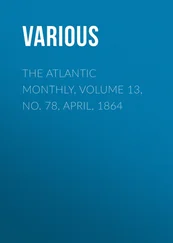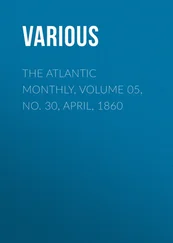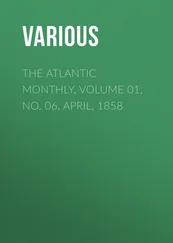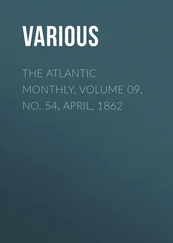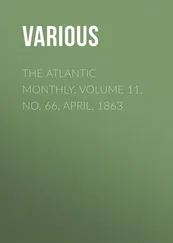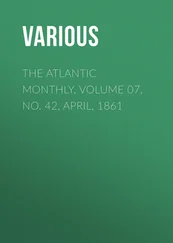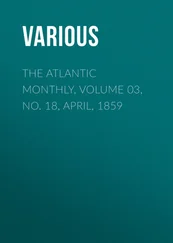Various - The International Monthly, Volume 3, No. 1, April, 1851
Здесь есть возможность читать онлайн «Various - The International Monthly, Volume 3, No. 1, April, 1851» — ознакомительный отрывок электронной книги совершенно бесплатно, а после прочтения отрывка купить полную версию. В некоторых случаях можно слушать аудио, скачать через торрент в формате fb2 и присутствует краткое содержание. Жанр: foreign_antique, periodic, foreign_edu, на английском языке. Описание произведения, (предисловие) а так же отзывы посетителей доступны на портале библиотеки ЛибКат.
- Название:The International Monthly, Volume 3, No. 1, April, 1851
- Автор:
- Жанр:
- Год:неизвестен
- ISBN:нет данных
- Рейтинг книги:3 / 5. Голосов: 1
-
Избранное:Добавить в избранное
- Отзывы:
-
Ваша оценка:
- 60
- 1
- 2
- 3
- 4
- 5
The International Monthly, Volume 3, No. 1, April, 1851: краткое содержание, описание и аннотация
Предлагаем к чтению аннотацию, описание, краткое содержание или предисловие (зависит от того, что написал сам автор книги «The International Monthly, Volume 3, No. 1, April, 1851»). Если вы не нашли необходимую информацию о книге — напишите в комментариях, мы постараемся отыскать её.
The International Monthly, Volume 3, No. 1, April, 1851 — читать онлайн ознакомительный отрывок
Ниже представлен текст книги, разбитый по страницам. Система сохранения места последней прочитанной страницы, позволяет с удобством читать онлайн бесплатно книгу «The International Monthly, Volume 3, No. 1, April, 1851», без необходимости каждый раз заново искать на чём Вы остановились. Поставьте закладку, и сможете в любой момент перейти на страницу, на которой закончили чтение.
Интервал:
Закладка:
Dr. Schäffner's Geschichte der Rechtsverfassung Frankreichs ("History of French Law"), just published, is noticed with high praise by the Frankfurt Oberpostamts Zeitung . The work has just been completed by the publication of the fourth volume, which only confirms the reputation which the earlier portions gained for the author among the jurists of all Europe. Dr. Schäffner, with equal learning and perspicacity, sets forth the relation of French law, and the changes it has undergone, to the history of the political institutions of the country. In this respect the work interests a much wider public than is ordinarily addressed by a juridical treatise. It opens with an account of the conflict between the elements of Roman and German law in France. Then it exposes the establishment of the feudal aristocracy and its contests with the power of the Church; next, the culmination of the royal authority, based on a bureaucratic administration, its final fall into the hands of the triumphant revolution, and its subjection to the various powers that have succeeded each other within the last sixty years. The fourth and last volume contains the history of the Constitution, of Law, and of the administration from the revolution of 1789 to the revolution of 1848. Dr. Schäffner exhibits in this volume no admiration for the various attempts to re-create the State according to abstract theories; he goes altogether for moderate progress, gradual reform, and keeping up the relation between the present and the past.
The fate of Bonpland, the eminent traveller and naturalist, is a topic of discussion in Germany. It seems that in a speech made in the Senate of Brazil, in August last, Count Abrantes said that Bonpland, after being released from his eighteen years' detention in Paraguay, had so far lost the habits and tastes of civilization that he had settled in a remote corner of Brazil, near Alegrete, in the province of Rio Grande du Sol, where he got his living by keeping a small shop and selling tobacco, &c., and that he avoided all mention of his former scientific labors and reputation. It seems, however, that Bonpland still maintains a correspondence on scientific subjects with his old friend Humboldt, which exhibits no falling off either in his tendencies or powers. On the other hand, some suppose that he does not return to Europe because he has taken an Indian wife, and finds himself happier in the wilderness in her company.
An official Russian account of operations in Hungary during 1849 has been published at Berlin, in two volumes. It is by a colonel of the general staff, and gives a detailed narrative of the entire doings of the Russian forces in that memorable campaign. It casts a full light upon the differences between Paskiewich and Haynau, and accuses the latter, apparently not without reason, of the grossest mismanagement. Even his famous march to Szegedin, which has passed for as brilliant and well-planned as it was a successful manœuvre, is not spared. Of course, as regards matters of detail, this writer varies largely from previous statements of the Austrians.
The second volume of Bülau's Secret History and Mysterious Individuals has just been published by Brockhaus at Leipzic. The first volume was published at the beginning of last year, and has been made known to American readers by an interesting review of it in Blackwood's Magazine , accompanied by copious extracts. It is undeniable that Professor Bülau has had access to materials unknown to previous writers, which he has used with laudable conscientiousness, to clear up many obscure points in history, and to explain the motives of many persons whose actions have been wondered at but not understood.
A work of some pretensions has just been published at Stuttgart, with the title, Italiens Zukunft (Italy's Future), by Fr. Kölle, who gives in it the fruit of seventeen years' residence in the country he treats of. He begins with the original elements composing the Romanic Nations, and goes on to consider the state of the country at the time of the Revolution, the doings of the French, the Restoration, the cities, commerce and navigation, the nobles, the peasantry, the Church, monastical religious orders, the Jesuits, possibility of Church reform, foreign influence, intellectual and scientific activity, Mazzini, prospects in case of a future revolution, &c.
A German translation of selections from the works of Dr. Channing is being published at Berlin. There are to be fifteen small volumes, of which six or seven have already appeared. The Grenzboten does not think much of the author, but classes him with Schleiremacher and his school. It says that Dr. Channing was a special favorite with women, which it seems not to intend for a compliment.
M. Flourens, one of the perpetual secretaries of the French Academy of Science, has published at Paris a collection of elegant and valuable essays. They comprise a dissertation on George Cuvier, one on Fontenelle, who is said to have best succeeded in casting on the sciences the light of philosophy, and an examination of phrenology, which M. Flourens discusses in the spirit of a disciple of Descartes and Leibnitz.
Jacques Arago, author of Souvenirs d'un Aveugle (A Voyage Round the World), &c., and brother of the astronomer and ex-minister, is one of the most remarkable characters of Paris. He is stone blind , and has been so for years; and yet he placed himself at the head of a band of gold seekers, and conducted them to California. Recently he returned to Paris, with little gold—indeed, with none at all—but in his voyage he met some extraordinary adventures, and is about to communicate them to the public in a volume. Jacques Arago is eminent in Paris not more for his abilities as a man of letters than for his fastidiousness, devotion, and success as a roué . If Love is sometimes blind, he is keen-sighted for the sightless Arago, who boasts of having loved and been loved by the most beautiful women of France.
The military history of the Napoleonic period has received a new contribution in the War of 1806 and 1807 , just published at Berlin, by Col. Höpfner, in two volumes. It is prepared from documents in the Prussian archives, and illustrated with maps and plans of battles. Not only does it add to our previous stock of information as to the military operations in Germany during these eventful years, but it serves at the same time as a history of the dissolution of that state which Frederic the Great erected with such labor and perseverance. We have here, in short, a picture of the downfall of the old Prussian military-system.
A new work on French History during the middle ages is La France au temps des Croisades , by M. Vaublanc, which has lately made its appearance at Paris, in four handsome octavo volumes. It is the fruit of long and conscientious researches, and is written in a style of seductive elegance. The author is no dry chronicler, or plodding statician, but an artist, fully alive to the picturesqueness of his topic. He carries his reader with him into the time and the scenes he describes, and makes him a participant in the romantic and adventurous life of the period. His book is thus as entertaining as it is instructive.
A convenient book of reference for those who deal with the more recondite and interesting questions of history is the Statistique des Peuples de l'Antiquité , by M. Moreau de Jonnés, just published at Paris. It is a work of great erudition and even originality. All sorts of facts as to the social condition of the Egyptians, Hebrews, Greeks, Romans, and Gauls, may be gathered from it. Another new work of a similar character is entitled Du Probleme de la Misére et de sa solution chez tous les Peuples Anciens et Modernes , by M. Moreau Christophe. Two volumes only have been published; a third is to follow. Price $1.50 a volume.
Читать дальшеИнтервал:
Закладка:
Похожие книги на «The International Monthly, Volume 3, No. 1, April, 1851»
Представляем Вашему вниманию похожие книги на «The International Monthly, Volume 3, No. 1, April, 1851» списком для выбора. Мы отобрали схожую по названию и смыслу литературу в надежде предоставить читателям больше вариантов отыскать новые, интересные, ещё непрочитанные произведения.
Обсуждение, отзывы о книге «The International Monthly, Volume 3, No. 1, April, 1851» и просто собственные мнения читателей. Оставьте ваши комментарии, напишите, что Вы думаете о произведении, его смысле или главных героях. Укажите что конкретно понравилось, а что нет, и почему Вы так считаете.
